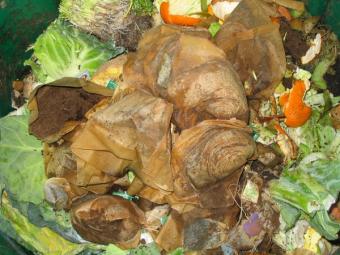
The advantages of a compost pile extend beyond just your own backyard. Composting is easy to adopt, and provides excellent fertilizer for your lawn and garden as well as reducing the number of garbage bags you send to the landfill. With multiple environmental benefits, composting also provides financial benefits and the satisfaction of moving towards a greener future.
Advantages of Composting
Whether you decide to build a compost pile or a compost bin, there are a number of good reasons for starting your compost today, including:
Home and Garden Benefits
- It's easy: The decomposing food does the work for you.
- Less garbage: Consider the reduction of waste in your own kitchen garbage when you compost, and you get an idea of how a composting nation can reduce garbage in city dumps and landfills.
- Your kitchen smells better: If the fruit and vegetable peelings move to the compost bin, you won't have the decomposing smell from your garbage can filling your kitchen.
- It's inexpensive: If you choose to do a compost pile, there is no need for fancy equipment; for a minimal cost, you can build your own bin or purchase one.
- It can save you money: If you have to pay per bag for a garbage service, you will be paying for less garbage to be hauled away. Even if you don't pay per bag, if a significant number of people in your community start composting, the town's garbage costs will go down. These savings can be passed on to residents in the form of lowering property taxes.
- You create a rich fertilizer: In a small amount of time, your composted scraps become a nutrient-rich, organic fertilizer that can be sifted and used to improve your garden, landscaping and grass. This fertilizer is also an economic benefit since you no longer have to purchase fertilizer at the garden shop; gardens fed with compost also require less water and less fertilizers to produce the same amount of growth as a garden without composted matter in the soil.
Environmental Benefits
According to the Environmental Protection Agency, composting has additional benefits for the environment beyond reducing the amount of waste going into landfills:
- Reduces Toxins: Soils that have been exposed to toxic matter, such as fuels or pesticides, regenerate into healthy soil faster if composted soil is added to the mix. Composting prevents the spread of these contaminants into water sources and nearby plants, meaning that not only the soil, but also the water and plants in the area will be healthier.
- Reduces Pollution: Composting keeps organic matter out of landfills, reducing the amount of methane production happening in garbage disposal areas.
- Prevents Erosion: Compost strategically placed can eliminate or reduce erosion near water, on hills, the side of the road and even at golf courses and playing fields.
- Promotes Healthy Growth: Soils, trees and plants in areas with compost are healthier. Incidences of plant diseases and pests that kill or damage plants and trees are lower when the soil has composted matter in it.
According to the Composting Council, composting also:
- Mitigates climate change (global warming)
- Reduces greenhouse gases
- Reduces water pollution
- Manages stormwater
Disadvantages of Composting?
Many people are reluctant to take up composting for the following reasons; however, simple solutions can remedy these small inconveniences.
- It's easier to simply throw away scraps in the garbage. It may seem easier at first, but once you are in the habit of composting, it truly takes no extra effort. While getting used to it, consider how you're lessening the impact on the environment with those few extra steps to your backyard compost pile or bin. Try using a compost bucket or a big bowl in your refrigerator to collect scraps, which will minimize your trips to the compost pile and keep insects out of your collection of scraps.
- Animals may get into the compost. An open compost pile may attract unwanted visitors, but there are a number of homemade bin solutions and bins available for purchase that can eliminate interested animals.
- Composting smells. While many people believe this myth, composting (when done correctly) only has an earthy odor.
Small Step, Big Impact
Like all aspects of green living, the smallest contribution in your home can make have a beneficial environmental impact. The advantages of a compost pile far outweigh the perceived disadvantages and can encourage more people to reduce waste through this easy activity. Visit the Beginner's Composting Guide if you would like to join in the composting movement and make a difference in your own backyard as well as on an environmental level.







